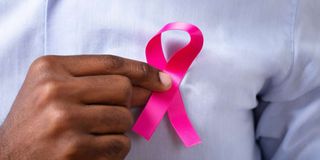Let’s close the cancer care gap

A man's hand holding a pink ribbon supporting breast cancer awareness. Kenya faces a monumental challenge: a formidable cancer care gap that pervades the country's healthcare system.
Kenya, like the rest of the world, faces a monumental challenge: a formidable cancer care gap that pervades the country's healthcare system. This void manifests in four critical domains, each crying out for immediate attention and a transformative overhaul: the funding gap, the awareness gap, the healthcare worker capacity gap, and the community support gap.
The fiscal deficit in cancer care financing in Kenya emerges as perhaps the most pressing concern, given its potential to alleviate other systemic issues.
Despite the growing number of cancer cases, the financial commitment to combating the epidemic remains insufficient. As a result, the healthcare system faces an acute shortage of critical resources, limiting its ability to provide timely and effective interventions.
This situation is exacerbated by a shortage of healthcare workers, a problem that many developing countries face. A severe shortage of healthcare professionals with specialised expertise in cancer care has put the healthcare system under strain.
According to a recent report from Kenya's National Cancer Institute, there aren't enough oncologists, oncology nurses, or oncology pharmacists to handle the disease burden. The growing demand for specialised care far outstrips the available supply, resulting in longer wait times and fewer treatment options.
Furthermore, the lack of healthcare facilities capable of handling cancer diagnosis and treatment exacerbates the crisis. Kenya had only 19 external beam radiation machines as of 2022, despite the fact that 42 were required.
Only eight of the available ones are in public hospitals, contributing to long wait times for this critical treatment option. Patients who choose private healthcare frequently face prohibitively high costs, posing an additional barrier to accessing necessary care.
In addition to the challenges in physical infrastructure, the lack of psychosocial support exacerbates the difficulties in cancer treatment, causing patients and their families to suffer profound mental anguish.
Stigma, misconceptions, and cultural beliefs about cancer contribute to an environment in which people are hesitant to seek help, disclose their illnesses, or support affected family members. This lack of psychosocial support mechanisms worsens the emotional and mental toll on patients and their families, impeding their ability to deal with the challenges of a cancer diagnosis.
Addressing this multifaceted gap requires a comprehensive approach that includes stigma reduction, community education initiatives, and the formation of strong support networks to provide much-needed emotional support.
- Dr Karimi is a Haemato-oncologist at Gertrudes Children’s Hospital; [email protected]




